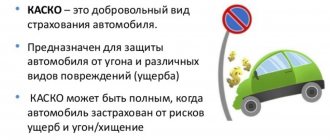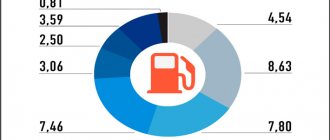Is it possible to get money instead of repairs with CASCO insurance?
The terms of the CASCO policy are regulated by the Civil Code of the Russian Federation and the Insurance Rules - they are approved when the insurance company is established. If the client, at the stage of drawing up the contract, chooses a cash payment scheme instead of repair work at a service station (usually a partner center), then the insurer does not have the right not to satisfy his request.
There are only three forms of compensation:
- payments with or without depreciation;
- transfer of aggregate or non-aggregate amount;
- repair at SK's partner service station or any other chosen by the client.
Neither party has the right to change the terms after the fact unless there is a legal basis for doing so. However, in judicial practice there have been precedents in which clients of insurance companies referred to the norms of the Civil Code and sought monetary compensation that was not regulated by the contract.
Be extremely careful when filling out insurance paperwork!
If the documents or protocol issued by the State Traffic Inspectorate state that the circumstances, time and/or location of the traffic accident could not be determined, it is not possible to classify this case as an insurable risk.
Therefore, at the stage of preparing documents (certificate, protocol and act), you need to be extremely careful and monitor what exactly the traffic police officers write.
If law enforcement agencies unreasonably doubt the circumstances you described, then you can, on completely legal grounds, appeal their decision to higher management by contacting either their superiors or the prosecutor’s office.
Another unpleasant moment. When turning to employees of the Department of Internal Affairs for help, they may suggest that you refuse to initiate a criminal case for damage to a vehicle due to the insignificance of the damage.
A police officer, as a rule, asks you to write a statement in which you, on a voluntary basis, ask not to initiate a case due to the fact that the losses incurred in an accident are not so significant for you.
If the injured person does not agree with this decision, then law enforcement officers may instead offer to quickly complete all necessary documentation. However, you should not agree to such tricks.
If you refuse to initiate a criminal case due to the insignificance of the losses incurred, then the insurance organization may legally refuse to pay compensation, both in money and repair services.
And all because you will deprive the insurer of the right to subrogation, according to Article 965 of the Civil Code. All information about subrogation can be found in the Civil Code of the current legislation (Chapter 48 or part two of the Civil Code).
I would also like to draw your attention to the fact that if you are going to write a statement to the police about the fact of illegal actions of third parties, then it is extremely important to have eyewitnesses to this incident.
Therefore, do not be lazy, walk through the apartments of the residents of the building, the windows of which overlook the scene of the crime, or inspect the yard for the presence of a CCTV camera. Today, most cars are equipped with DVRs that operate continuously.
And if you manage to find such a car, be sure to write down the state license plate of the vehicle so that in the future you can use it to identify the name of the owner of the vehicle and ask for records from the device, which can become irrefutable evidence of the offender’s guilt.
The presence of eyewitnesses to the incident is also desirable in situations where a traffic accident occurred in the yard or during the absence of the car owner.
That is, some driver, while performing a maneuver, scratched your vehicle and safely disappeared from the scene of the crime, without leaving any of his data on the windshield of your car (phone number, last name and initials, and, in the end, a receipt so you can get money from the bank and get your car repaired).
Why do insurance companies insist on compensation in the form of car repairs?
It is not profitable for insurance companies to violate the terms of the contract with the client. But there are situations when the document does not contain a clause on mandatory repairs at a service station, but when the policyholder contacts the company’s employees, they begin:
- convince him that repairs are necessary;
- prove the legality of the requirements of the insurance rules.
The reason for this behavior:
- An examination of damage is not always carried out before repairs. If the insurance company was able to convince the owner that there is no need for an assessment, then it is possible that only visible defects will be eliminated at the service station. At the same time, some damaged components may be missed - this reduces the cost of work and saves the insurer money.
- Service stations often work under a partnership program with insurance companies. Mechanics install parts purchased cheaper - the reporting documents reflect prices that do not correspond to the actual ones.
- Other cost cutting schemes. To avoid fraud, you need to conduct an examination before and after repairs.
Related article: CASCO insurance for a taxi and how to get it.
At the same time, repairing external defects and other components can be beneficial for the policyholder. You need to evaluate the proposed conditions before trying to achieve cash payments.
Important! If the conditions described in the insurance contract do not comply with the law and infringe on the consumer rights of the policyholder, then they are declared invalid in court.
If the case goes to court, you will need to prepare evidence of negotiations with the Investigative Committee. The consumer's requirement cannot be satisfied on the basis of unsubstantiated statements. Correspondence, written notices, calls, etc. are suitable as evidence.
Referral for repairs
And now a few words about how long the direction for repairs is valid and how it is issued. In practice, an insurance company cooperates with several service stations and provides its clients with the opportunity to choose an organization. There is no single form for referring insurance for repairs, so each company uses its own template, which must include the following information:
- FULL NAME. the policyholder;
- CASCO policy number;
- name of the insurer;
- number and date of the report on the occurrence of the insured event;
- vehicle data – make, model, year of manufacture, license plate number and VIN code;
- the amount of repairs based on the assessment results;
- name of service station;
- the amount of the deductible, if it is provided for under the insurance contract;
- list of damages and necessary work (compiled in table form);
- attachments (calculation of the amount of compensation, examination report, etc.);
- signature of the responsible person and company stamp.
Required documents
To receive a referral for repairs, you must provide the damaged vehicle for inspection and damage assessment, as well as the following documents:
- application for reimbursement;
- passport;
- vehicle registration certificate;
- a valid CASCO policy;
- driver's license;
- expert opinion, if the assessment is carried out by an expert organization;
- documents from the traffic police regarding the accident - the need to provide them depends on the terms of the contract.
The validity period of the referral is three years. During this period, you must provide your vehicle for repairs.
Under what conditions is a cash refund possible?
If repair work is paid for by the insured, then according to the law (Article 929, paragraph 1 of the Civil Code), the insurance company undertakes to compensate for expenses at the request of the client. Before this, an independent assessment examination must be carried out.
Registration procedure:
- The damaged car is handed over to the insurer.
- An assessment examination is appointed (for reliability, the vehicle owner has the right to additionally order an assessment from a third-party specialist).
- The expert issues a report in which the cost of repairs is calculated.
- The car is sent to the service station.
- After the repair, the insurer re-evaluates the car and draws up a delivery certificate, which records all the work performed.
The insurance company undertakes to pay the costs declared by the appraiser. To confirm expenses, a receipt from the car service center is attached to the expert’s report.
There are situations when the insurance company sends the driver to a service center, but the car cannot be repaired for one of the reasons:
- queues;
- The service station refused service due to the large volume of work;
- the repair was carried out, but not completely or of insufficient quality.
In such a situation, the policy holder has the right to claim a cash payment, since the conditions for mandatory repairs from the insurer’s partner cannot be met.
Vehicles under warranty are repaired only at the service center of the company's official dealer. If the car is sent to a third-party service station, the insurer pays the costs indicated in the invoice.
Deadlines for repair work under CASCO
The time frame for car repairs under CASCO insurance is not regulated by law, so they must be provided for in the insurance contract. In any case, this period, according to the Law “On Protection of Consumer Rights,” cannot exceed 45 days.
Before transferring the vehicle to the service station, you should agree with the specialists on the timing of ordering the necessary parts and performing restoration work. In accordance with the Decree of the Government of the Russian Federation No. 290 of April 11, 2001 (Chapter II), the customer and the contractor enter into an agreement, which must specify the dates of acceptance of the machine for repairs and the period for its implementation.
What influences the timing of repairs?
Having figured out how to repair a car under CASCO at a service station, you should also take into account factors that affect the timing of restoration work.
Severity of injuries received
When it comes only to replacing a bumper, headlight, mirror or painting scratches, the car can be in a car repair shop for a week. And if you need to replace the engine, hood, fenders, doors or repair numerous damages, more time is needed. If the car received more than 70% damage, it may be considered unsuitable for restoration with subsequent payment of compensation.
Uniqueness of parts and components
When a domestic car or a foreign-made model common in Russia requires repairs, there are no problems with the availability of the necessary parts. In the case of rare or expensive foreign cars, you will need to order spare parts abroad, which will significantly increase the vehicle restoration time.
Coordinated actions of the service station and the insurance company
When repairing cars under CASCO, efficiency and coordination between the insurer and the work contractor are important. For example, if hidden defects are discovered that were not noticed during the damage assessment, the cost of repairs increases, and the allocated amount may not be enough. In this situation, the time frame for eliminating all damage will depend on how quickly the service station employees agree on additional costs with the insurance company.
Queue at the service station
It is likely that a queue may form at the car service center. This situation usually occurs after unfavorable weather conditions in winter or in the fall when the first snow suddenly falls, when many did not have time to change summer tires to winter ones, which resulted in many accidents.
Penalty for failure to meet deadlines
Responsibility for meeting the deadlines for car repairs under CASCO lies not with the service station, but with the insurance company with which the contract is concluded. You can demand payment of a penalty both pre-trial and in court. Its minimum amount is 3% of the policy cost for each day of delay. If the court decision is in favor of the car owner, the insurance company will have to reimburse him for legal costs.
How to receive a cash payment as compensation under CASCO
The money will be transferred to the client’s bank account (it is indicated in the application for payment). By agreement with the insurance company, it is possible to receive cash at the cash desk.
How to get money under CASCO:
- Draw up and submit an application for payment (no later than within 3-7 days after the accident - the exact timing is specified in the individual agreement).
- Prepare and attach a package of documentation (certificates, copies of identity cards, receipts) to the application.
- Provide the vehicle for inspection by an appraiser and drawing up a report.
- Wait until the money is transferred to the policyholder’s account (the terms are specified in the contract).
This option of hassle-free payments is possible only if the agreement includes a clause on the possibility of payment in cash equivalent, instead of sending it to a service station for repairs.
Article on the topic: Features of total car loss under CASCO
Correct formulation of the reason why you chose money
Changing the terms of the agreement, if it does not describe the possibility of paying money in cash, is possible only with mutual agreement of the parties. If the policy does not allow you to receive funds in lieu of repairs, then the above scheme will be useless.
Important! It is recommended to re-read the agreement with the insurance company. There may be a clause about your options for obtaining a refund.
The insurance company can accommodate the policyholder halfway and agree on a transfer of money in circumvention of the terms of the contract if the application indicates one of the reasons for the request:
- the car has been stolen - repairs at a service station will not be required to restore the property;
- after eliminating the damage, problems remain with the operation of the vehicle (the services were provided poorly or incompletely) - for this, an additional examination is carried out, the report of which becomes the basis for the claim.
If the insurance company refuses to satisfy the client’s request and follows the terms of the contract (when there are no notes on the payment of money), then the issue can only be resolved through the court. Moreover, the applicant needs to prove the legitimacy of the claim.
How to fill out an application and required documents
The application must be written within 7 days after the occurrence of the insured event.
It describes the facts:
- where and when the event occurred;
- what are the reasons;
- what damage did the car receive?
If the agreement allows you to claim funds, you can re-indicate the details for the transfer in the document. If the policy describes other methods of calculation, then the policyholder needs to justify the reason why he is asking for compensation in the form of payment.
It can be:
- difficulties with repairs (the necessary work can only be carried out at a special service station that is not a partner of the insurance company);
- the car was involved in an accident far from the insurer's service center and cannot be delivered to the site for repairs.
The company can meet the client and satisfy the requirement. However, this is her desire, not her obligation. If the insurer follows the contract, then it has the right to limit itself to sending the car for repairs, with which the applicant may agree or not. If the client voluntarily refuses the service, this does not give him the right to receive payment. The final decision remains with the Investigative Committee.
For any money transfer, the company will require the applicant to provide documents. Without evidence, the occurrence of an insured event can be disputed.
The client is required to prepare:
- application (sample);
- copy of ID;
- a copy of the CASCO policy;
- proof of vehicle ownership (registration, driver's license);
- certificate from the traffic police, police, Ministry of Emergency Situations or other authority (depending on the insured event);
- act of expert assessment.
The more supporting documents are attached to the case, the greater the chances of the claim being satisfied. The insurance company does not have the right to request from the client papers that are not provided for by the rules or to refuse compensation on this basis. However, the policyholder may, on his own initiative, provide additional photographs, video materials, witness statements and other evidence of events.
Article on the topic: Registration and calculation of CASCO for a new car
What else should you provide to the insurer?
You can convince the insurance company to transfer money if you provide evidence of the need for this. For example, an expert’s report that repairs at the insurer’s service station are impossible.
It reflects the facts:
- Date of preparation;
- document number;
- details of the appraiser;
- inspection time;
- location of the assessment;
- vehicle brand;
- registration number, VIN;
- official mileage;
- owner's passport details;
- description of damage;
- defects during use;
- signatures of the parties.
If the act is drawn up with an error, this may affect the amount of payment.
Terms of payment of compensation
In practice, money is transferred within 30 days. In the case of CASCO, all conditions are described in the contract - there are no legislative acts regulating the process. Large companies pay compensation within 15 days.
A little theory
Before we talk about whether it is possible to receive a cash payment instead of repairing a vehicle if you have CASCO insurance, I would like to dispel the most common myths regarding this issue.
Myth No. 1 – CASCO policy insures the vehicle against everything
Many car enthusiasts think so, and they are deeply mistaken. Often even the insurance agents themselves convince you of this when trying to sell you this insurance policy. But you shouldn’t believe everything they try to force on you. The insurer's opinion is just a memorized phrase that acts as an advertising ploy, and nothing more.
Your vehicle is insured against exactly those cases that are specified in the list of risks of the CASCO insurance policy.
A fire that occurs due to spontaneous combustion or weather conditions is not arson, illegal actions of third parties, theft and theft for the purpose of driving, as well as various types of falling objects and weather events with natural disasters.
Myth No. 2 – having paid all insurance premiums, I have the right to receive compensation payment
This opinion is true, but there are some nuances.
The insurance institution is obliged to pay compensation only if you have complied with all insurance rules. But even here there are pitfalls. The set of rules of the CASCO insurance contract often contradicts the current legislative framework, due to which only those obligations that do not lead to offenses should be observed. Of course, insurers are also obliged to adhere to the rules and responsibilities on their part.
Well, now we can talk about how to get a cash payment instead of the repairs offered by insurers.
What to do in case of refusal
In an official refusal, the Investigative Committee may indicate any reason for refusing to pay compensation in money. In most cases, the company refers to violation of the rules:
- intentionally causing damage to a car to obtain money;
- there are no claims against the culprit of the accident, which is proven in writing by law enforcement agencies;
- refusal to restore minimal damage to the injured party’s vehicle;
- traffic police officers were not called to the scene of the incident;
- the application to the Investigative Committee was sent late;
- the unreliability of the facts described by the client was revealed;
- the owner repaired the vehicle without conducting an examination.
The decision of the Investigative Committee can only be challenged in court. The application must provide evidence and reasons for the complaint.
The cash payment will be guaranteed to be transferred to the client if stipulated in the agreement. If not, the policyholder must reach an agreement with the insurance company. She has the right to satisfy the request or refuse the request. Its decision can only be challenged in court.
Reasons for service station refusal to carry out repairs
Having received a referral for repairs from his insurance company, the car owner may encounter difficulties at the service station, which sometimes refuses to carry out repairs, motivating its actions for the following reasons:
- lack of necessary spare parts;
- debt of the insurance company to the service station;
- lack of suitable specialists on the organization’s staff;
- The contract with the insurance company has expired.
What to do
If you have problems with accepting your car to a service station, you should first contact the insurance company with a written request to send you to another repair organization or pay compensation in cash. If the insurer fails to act, the problem can only be resolved through the courts.
Number of requests for money under CASCO
Receipt of cash is not limited by the number of requests and is carried out in the amounts specified in the agreement. For example, the client is entitled to:
- Several refunds until obligations are fully fulfilled;
- Payment of funds in case of theft or complete destruction of the car without the possibility of its restoration.
The insurance contract specifies the maximum amount, which should not exceed the market value of the car. The car owner cannot receive the full amount of compensation because:
- In case of theft, the insurance company deducts depreciation from the amount;
- If the insured event is satisfied, the cost of the policy is reduced by the amount of the payment made.
In the event of a theft following an accident, the policyholder will receive not the full balance of the insured amount, but part of it minus the wear and tear of all parts. Insurance companies recognize a car as beyond repair if an expert determines at least 80% damage. The maximum payout amount will be reduced by 20%. Insurers are of the opinion that this amount can be sold for scrap metal or spare parts.
How to receive compensation in the form of cash
The procedure for issuing financial resources is provided for in the CASCO agreement. The conditions specified in it are changed and fixed only with mutual consent of the parties. If the policy does not provide for cash payments, then it is impossible to resort to this form of compensation.
Therefore, the policyholder must study the concluded contract - there is a high probability that it contains a clause on payments or other methods of compensation for damage. The amount of losses is calculated in one of two ways:
- Contacting experts for calculations and paying for their services;
- The insurance company carries out the verification if the client trusts its agents.
You can compensate for damage in cash if this condition is not specified in the contract:
- The car was stolen by criminals, which is why assistance from a service station is not required, but the situation should be discussed with the insurer in advance;
- Problems in the operation of the machine persisted after the repair, the work was carried out incompletely or poorly - this fact can only be proven on the basis of an independent examination;
- Fraud or breach of contract has been detected.
In the latter case, the problem can only be resolved in court.
Possible features
As you can see, there are different options for payment conditions without supporting documents. Therefore, it is necessary to use this tool, as they say, “with knowledge of the matter.” It is also useful to understand the following nuances.
- No insurer will pay without certificates for damage to internal interior elements.
- Settlement of losses without documents may not be made in relation to body kit and tuning elements (including tinting). In addition, damage to a car sunroof or glass roof panels is most often considered an exception.
- Sometimes a company will not pay anything if the cost of damage exceeds the liability limit for undocumented payments. For example, with a “simplified” compensation limit of 15,000 rubles and damages of 16,000 rubles, the insurer may not pay anything at all.
- If the contract stipulates that payment without documents is paid only for one damaged element, even minor damage to an “adjacent” body part may leave the policyholder without compensation.
- The Insurance Rules regarding payments without certificates sometimes contain the wording “the insurer has the right” or similar. It is clear that in this case the company does not formally undertake the obligation to pay without documents. This means he can always refuse this. The phrases “if provided for by the contract” are also possible, requiring a direct indication of the corresponding option in the text of the policy.
- If compensation without documents is provided only for damage to the glazing of the body (interior), they may not pay for side mirrors. Because most often they are not considered part of such glazing. By the way, formally, many external lighting elements consist of plastic and not glass, although in the event of an accident, questions about them usually do not arise.
- Some companies practice settlement of losses without documents only when sending for repairs. In this situation, in order to receive compensation in “money” you will have to provide supporting documents.
- Some insurance companies set different limits for compensation without documents for domestic cars and foreign cars.
However, the conditions for “simplified” payments are not always fraught with only limitations and potential difficulties. Some insurers, if several elements of the car are damaged, allow the car owner to choose one, the repair of which will be paid for.
E-OSAGO at a competitive price
The mobile application from INGURU will save time and money: 18 insurance companies, online payment, policies are saved in the application and sent to e-mail
Source
Regulatory regulation of car repairs under CASCO
The legislation does not provide for a separate law on car repairs under CASCO. At the same time, there are currently many regulations governing the relationship between the insurance company and the policyholder. Federal Law No. 4015-1 of November 27, 1992 (as amended on July 29, 2018) establishes that voluntary insurance is subject to the terms of the contract and the rules governing all the conditions of the service provided and the conditions for its execution. They are determined by the company selling the policy or an association of insurers. The rules include information:
- about subjects and objects;
- about insured events and risks;
- on the timing of provision of insurance payments;
- conditions for determining the amount of compensation;
- duties of the parties;
- determining the amount of damage received;
- features of providing compensation;
- list of grounds for refusal;
- other provisions.
For more information about car repairs under CASCO, please refer to Chapter 48 of the Civil Code of the Russian Federation. It describes the concepts used, determines the procedure for drawing up the contract and its mandatory clauses, establishes the obligations of the parties and other significant conditions.
What to do if refused?
If a company refuses to pay a client, it is initially necessary to resolve the issue out of court, since most organizations agree to a meeting because they do not want to damage their reputation.
If the company still refuses to fulfill the terms of the contract, the client has the right to request a document confirming the reasons for the refusal, as well as a reasonable calculation of the amount of damages. If the client received an official refusal, then it is necessary to file a complaint with the body providing insurance supervision - the Central Bank of Russia. After the expiration of 20 days, the Central Bank will have to consider the composition of the claim and detect violations in time.
Actions in case of poor-quality car repairs under CASCO
When you accept a car after repairs have been made under CASCO insurance, be sure to conduct a thorough inspection of it. Clearly record all the shortcomings you see in the acceptance certificate. If you do not do this, then it will be almost impossible to prove that they appeared during the repair.
Who should you send your complaint to if you find the quality of the service provided is poor? First of all, of course, it seems that the car service is to blame. But in case of car repair under CASCO, the responsibility lies entirely with the insurance company, since they provide compensation in the form of restoring the car at a service station. This is enshrined in Resolution No. 20 of June 27, 2013 of the Supreme Court of the Russian Federation. If you find yourself in this situation, submit your claim in writing to your insurer.
Experts recommend doing the following:
- It is necessary to conduct an independent examination of the car in order to identify repair defects and the cost of correcting them.
- Submit a formal claim in writing and hand it to the insurance company representative in person. You can also send by registered mail with acknowledgment of receipt to the address. Be sure to ensure that your letter is registered in the incoming documentation and request a stamped and signed copy.
- If you do not receive any response from the insurer, file a claim in court.
Do not forget that in cases related to voluntary vehicle insurance, there is a statute of limitations. In accordance with Article 966 of the Civil Code of the Russian Federation, it is 2 years.
Car repair under CASCO from an official dealer
Repairs to a car that is still under warranty can be carried out under CASCO if the corresponding clause is included in the insurance. This type of damage compensation has a number of advantages and disadvantages. The advantages are as follows:
- The specialists of the official dealership constantly improve their skills, so they can provide services at a higher level.
- If within a year after the car has been repaired, some kind of breakdown occurs at the official supplier, servicing and replacing the faulty part will cost you free of charge, as the warranty applies.
- The manufacturer carefully monitors the equipment at official service stations. It must pass their testing and meet high technical requirements.
- The parts needed to repair a car are delivered much faster than to regular service stations, as they come directly from the manufacturer and are stored in warehouses.
It is also worth knowing about the disadvantages of this option for compensating for damage and repairing a car:
- The price of services in an official service station is very different from prices in non-accredited companies. Be prepared that repairs will be expensive, which in turn will affect the cost of insurance. Even higher prices for cars under warranty.
- You should not blindly hope that the official service station does not make mistakes in repairs. You can find many reviews about the poor quality of services provided in such service centers, because all this is tied only to the honesty and professionalism of the employees.
- Usually, according to the contract, the car repair time under CASCO should not exceed one month, but in reality you need to be prepared that they can be doubled or tripled.
- You should also be wary of possible unscrupulous and fraudulent actions with the car. Of course, this is possible not only at an official dealer and depends only on the integrity of the employees. But there is a known case when the owner of a vehicle had to prove in court that a service station replaced a serviceable part with a defective one, although the staff denied this. Fortunately, he won the case.
Situations when car repairs are required under CASCO in 2020
Car repairs at the expense of CASCO are only possible if a clause about it is included in the contract. According to Article 943 of the Civil Code of the Russian Federation, all terms of the contract must be defined in the insurance rules. If there is no provision for repairs in the contract or its annexes, then the insured has no grounds to make such a requirement. It will also be declared illegal if challenged in court.
In 2021, CASCO has a number of additional features:
- Compensation for damage occurs only when an insured event occurs, specified in the contract or insurance rules . For example, if your car was stolen or you were in an accident, but the terms of the agreement did not include a clause about compensation in such situations, the insurer may refuse to repair it.
- Does not affect compensation for damage, who was at fault in the incident . Compensation is also provided in case of fire or damage from natural phenomena. But, it is worth noting that in case of suspicion of intentional damage to vehicles, an inspection will be carried out and a claim will be sent to court.
- A car purchased from an official supplier can be repaired at their service center if the warranty has not yet expired . Insurance companies do not seek to include such an option in the CASCO terms, since it is unprofitable for them. Most often, the insurer has an agreement with certain service stations to which they send clients’ vehicles if repairs are necessary. Therefore, please pay attention when taking out insurance that it includes a provision for repairs from an official supplier with a valid warranty.
In what cases do insurance companies not pay?
There are many cases in which insurance companies may not pay the required funds, these include:
- if the policyholder intentionally caused damage to his car;
- driving by a driver who is not included in the insurance policy;
- driving under the influence of alcohol or drugs was recorded;
- the car was in unused condition;
- violation of road rules;
- suffered damage from military or terrorist actions;
- the car was confiscated by court order;
- when registering an insured event, the necessary documents were not provided;
- the vehicle had a manufacturing defect.
These are not all cases that can be established by the insurer; in fact, there are even more of them. Therefore, carefully inspect the contract when concluding and carefully read all the clauses.
Grounds for an insurance company's refusal to pay
The insurer may refuse payment only in cases strictly defined by the contract.
The reason is an incomplete package of documents submitted to receive insurance compensation , or a discrepancy between the claimed damage and the event described in the accident report or other documents.
A decision to refuse to initiate a case, if it was drawn up with violations, may also cause the insurance company to refuse.
They can refuse if:
- the event cannot be recognized as insured;
- the culprit of the incident has not been identified (and this is confirmed by documents);
- the owner of the insurance violated the procedure for settling losses (did not issue a Notification of an accident, left the scene of the accident, did not notify the insurer on time, did not provide the car for inspection, etc.).










